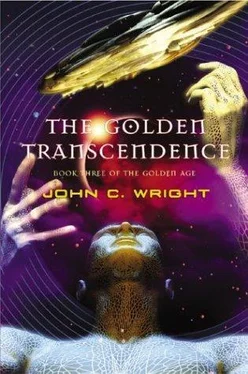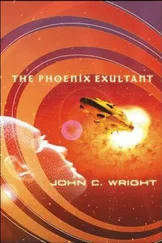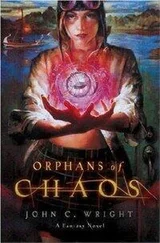A diagram of a philosophy file appeared in the Middle Dreaming. There were thousands upon thousands of branching conversation trees, created by Rhadaman-thus Sophotech to anticipate every possible combination of objections and counter-arguments. There were hundreds of definitions, examples, and a compendium of cross-linked metaphors and similes.
The summary of the proof read:
Axioms: A statement that there is no truth, if true, is false. Nor can anyone testify that he has perceived that all his perceptions are illusions. Nor can anyone be aware that he has no awareness. Nor can he identify the fact that there are no facts and that objects have no identities. And if he says events arise from no causes and lead to no conclusions, he can neither give cause for saying so nor will this necessarily lead to any conclusion. And if he denies that he has volition, then such a denial was issued unwillingly, and this testifies that he himself has no such belief.
Undeniably, then, there are volitional acts, and volitional beings who perform them.
A volitional being selects both means and goals. Selecting a goal implies that it ought be done. Selecting a means that defeats the goal at which it aims is self-defeating; whatever cannot be done ought not be done. Self-destruction frustrates all aims, all ends, all purposes. Therefore self-destruction ought not be sought.
The act of selecting means and goals is itself volitional. Since at least some ends and goals ought not be selected (e.g., the self-defeating, self-destructive kind), the volitional being cannot conclude, from the mere feet that a goal is desired, that it therefore ought to be sought.
Since subjective standards can be changed by the volition of the one selecting them, by definition, they cannot be used as standards. Only standards which cannot be changed by the volition can serve as standards to assess when such changes ought be made.
Therefore ends and means must be assessed independently of the subjectivity of the actor; an objective standard of some kind must be employed. An objective standard of any kind implies at the very least that the actor apply the same rule to himself that he applies to others.
And since no self-destruction ought be willed, neither can destruction at the hands of others; therefore none ought be willed against others; therefore no destructive acts, murder, piracy, theft, and so on, ought be willed or ought be done. All other moral rules can be deduced from this foundation.
Helion dismissed the text. "I do not need to see this again. I wrote this argument."
Daphne regarded him with a surprised and skeptical look, "And now you say you don't believe it yourself?"
Helion spread his hands: "I do believe it, but I believe it because I place a high value on logic and come from a scientific and advanced culture. Sophotechs are creatures of pure logic; so naturally they would be convinced of the same thing. But the Silent Oecumene, from everything we can tell, was a culture that placed a low value on rationality. Their machines were programmed not to listen to reason. So it is futile to use reason to convince them. That's my point. Logic is a human construct. Humans can ignore it."
Phaethon answered: "Sophotechs cannot."
Atkins objected: "This argument here just looks like a word game to me. I could poke a dozen holes in it, or pick flaws in your ambiguous terms. And I'm just a man. If I had the mind of a Sophotech, I'm sure I could find a million exceptions to it, a million reasons why it just so happens not to apply to this particular situation."
Helion made a mild reply, "Captain, that summary has volumes of continued argument, definitions, and clarifications behind it. It is internally self-consistent. If you agree with any part of it, you have to agree with the rest. Perhaps you should study it more before you decide."
Atkins answered, "You're missing the point. Phaethon said this is a question of fixing a broken machine, and you, Helion, are talking like this is a debate society, where whoever breaks the agreed-upon rules of logic will bow out like a good sport. That's all hogwash. The enemy is not going to stand still and let himself get fixed, not if getting fixed will lose him the war. The enemy is not going to play by any rules if those rules require him to lose."
Phaethon said, "I am not sure that this thing is actually an enemy at all. This may be merely a fellow victim of the insanity of the Second Oecumene. It is not aware of the meaning or the implications of its own actions. It is broken. I can fix it. As soon as it knows that everything it knew was all a lie, it will be burning to find out the truth about itself. Once anyone finds out that the truth is being kept from him, he tries to find it out."
Atkins said, "You're reading your own desires into it. Not everyone puts truth above all things."
Phaethon said, "And you are reading your own desires into it. Not everyone puts winning above all things."
"Survivors do."
"Sophotechs do not."
Atkins said heavily: "But you are the one who says this thing is not a Sophotech. It's not entirely self-aware. It's not entirely a creature of pure logic. You actually don't know what it is, what it thinks like. You know nothing about it. None of us do."
Phaethon said, "I know one thing. And I know it with an unshakable certainty. Just this: Reality cannot lack integrity. That is the nature of reality. One part of reality cannot contradict another part, not and be real. Likewise, one thought cannot contradict another thought, not and both be true. One desire cannot contradict another, not and both be satisfied.
"If reality contradicts your thoughts, that's delusion. If your thoughts contradict your actions, that's madness. If reality contradicts your actions, that's defeat, frustration, self-destruction. And no sane being wants delusion, madness, and destruction.
"And here, with this philosophy given me by my father, the courage given me by my wife, the technique given me by the Earthmind, and this great ship I have made myself, I have the tools and abilities and equipment I need to correct the delusion and madness and destruction which the Silent Oecumene has unleashed upon our peaceful society.
"Gentlemen, believe me! This is an engineering problem, a problem of applied logic! All the eventualities have been prepared for. I do not care how much smarter than I am this Nothing Machine might be: I have closed off every other avenue available, except the one which leads to my success. This plan cannot fail!" Phaethon saw that all the men around the table were staring at him as if he was doomed. Atkins said, "And what if it is not sane?" Phaethon saw no point in trying to answer that. It seemed so obvious to him, so clear. He merely compressed his lips, shook his head, a sad look in his eye. Atkins got up, looking grim and disgusted, and left without a further word. Diomedes said to himself, aloud, "Well. We've heard Phaethon say he knows where madness and delusion come from. I wonder where overweening pride comes from?" With a gentle smile, he excused himself, and wandered away.
Helion also got up, and he muttered to Daphne on a "side channel, "Anyone who thinks he has perfectly foreseen every possible eventuality has a lot to learn about the chaos at the heart of reality. I hope his lesson won't be as painful as mine has been. There is more at stake here than just one life."
But Daphne's eyes were shining with quiet pride. She believed every word Phaethon said. She answered Helion on a public line, so that Phaethon overheard her: "How can you doubt Phaethon's ability to build a flawless plan, one which leaves those who oppose him with no choice and no chance to defeat him? Haven't I just finished explaining that this was exactly what he did to you and your Hortators, Helion? None of you know him as I do. Watch and see what he does!"
Читать дальше










